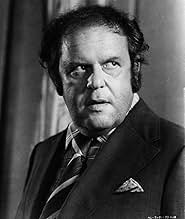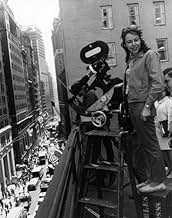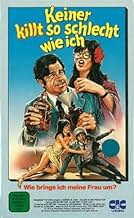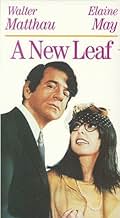NOTE IMDb
7,3/10
8,3 k
MA NOTE
Henry Graham vit la vie d'un playboy. Lorsque son avocat lui dit un jour que son train de vie a consommé tous ses fonds, il a besoin d'une idée pour éviter de descendre dans l'échelle social... Tout lireHenry Graham vit la vie d'un playboy. Lorsque son avocat lui dit un jour que son train de vie a consommé tous ses fonds, il a besoin d'une idée pour éviter de descendre dans l'échelle sociale.Henry Graham vit la vie d'un playboy. Lorsque son avocat lui dit un jour que son train de vie a consommé tous ses fonds, il a besoin d'une idée pour éviter de descendre dans l'échelle sociale.
- Réalisation
- Scénario
- Casting principal
- Récompenses
- 1 victoire et 3 nominations au total
Conrad Bain
- Professor Heinrich
- (non crédité)
Ida Berlin
- Maid
- (non crédité)
Mildred Clinton
- Mrs. Heinrich
- (non crédité)
Trent Gough
- Victor the Butler
- (non crédité)
Avis à la une
A New Leaf (1971)
A kookie, forcibly odd movie. If at first you think it's just plain stupid, keep watching. It's really well balanced, smartly written, and acted with more restraint than usual for a madcap movie like this.
It's billed (by some) as filled with dark humor, but it didn't strike me as dark, not like the contemporary "Harold and Maude" for example. But there is an unusual tone achieved here that is just slightly different and worth getting a feel for. There is, for another example, a parallel in general plot and scenario to "How to Murder Your Wife" from 1965, complete with the willing butler and the hapless rich bachelor, but that movie is a silly 1960s farce and this one has an edge of almost poignancy to it. (I write that word and think Elaine May would cringe--only because I don't think there is an intention to be sentimental or even romantic, the last scene notwithstanding.)
The star is singularly Walter Matthau, who is almost necessarily goofy just by appearances. But maybe the first clever trick by the director, Elaine May, is putting the goofy man in even goofier situations so that he comes off as actually someone serious and believable. To have his character, Henry Graham, driving in his red Ferrari wearing a crash helmet is pure insanity, yet you don't blink an eye. The guy is self-absorbed and nuts. But also very likable, a little out of touch the way we all are, or wish we could be (if we had his money).
And of course the man's dilemma is stated immediately: the money he once had so much of is used up. And you have to see to appreciate the one long scene in the first twenty minutes with Graham meeting his financial adviser about some bounced checks. This is comedy at its absolute best--I mean that. Watch only this scene if you must (and I dare you to skip the rest of the movie once you do). The actor opposite Matthau here is William Redfield, who pulls off the most brilliant of performances.
The other leading character, eventually, is Elaine May herself as the clumsy, naive, filthy rich scientist who Graham sets his sights on for salvation. She is terrific, as well, and like Woody Allen of the same time ("Bananas" is also 1971) seems to direct her own comic zaniness with a calculated distance. The rest of the shenanigans play out with the necessary twists, and it's consistently funny.
So, see this for its freshness even four decades later. No wonder it has a (small but growing) cult following. May has suffered historically from having made the bizarrely awkward "Ishtar" and for being forever linked in the early 1960s as the comedy partner of Mike Nichols, whose movie career overshadows almost everyone's. But here, at least, she shines on her own terms, without distraction.
A kookie, forcibly odd movie. If at first you think it's just plain stupid, keep watching. It's really well balanced, smartly written, and acted with more restraint than usual for a madcap movie like this.
It's billed (by some) as filled with dark humor, but it didn't strike me as dark, not like the contemporary "Harold and Maude" for example. But there is an unusual tone achieved here that is just slightly different and worth getting a feel for. There is, for another example, a parallel in general plot and scenario to "How to Murder Your Wife" from 1965, complete with the willing butler and the hapless rich bachelor, but that movie is a silly 1960s farce and this one has an edge of almost poignancy to it. (I write that word and think Elaine May would cringe--only because I don't think there is an intention to be sentimental or even romantic, the last scene notwithstanding.)
The star is singularly Walter Matthau, who is almost necessarily goofy just by appearances. But maybe the first clever trick by the director, Elaine May, is putting the goofy man in even goofier situations so that he comes off as actually someone serious and believable. To have his character, Henry Graham, driving in his red Ferrari wearing a crash helmet is pure insanity, yet you don't blink an eye. The guy is self-absorbed and nuts. But also very likable, a little out of touch the way we all are, or wish we could be (if we had his money).
And of course the man's dilemma is stated immediately: the money he once had so much of is used up. And you have to see to appreciate the one long scene in the first twenty minutes with Graham meeting his financial adviser about some bounced checks. This is comedy at its absolute best--I mean that. Watch only this scene if you must (and I dare you to skip the rest of the movie once you do). The actor opposite Matthau here is William Redfield, who pulls off the most brilliant of performances.
The other leading character, eventually, is Elaine May herself as the clumsy, naive, filthy rich scientist who Graham sets his sights on for salvation. She is terrific, as well, and like Woody Allen of the same time ("Bananas" is also 1971) seems to direct her own comic zaniness with a calculated distance. The rest of the shenanigans play out with the necessary twists, and it's consistently funny.
So, see this for its freshness even four decades later. No wonder it has a (small but growing) cult following. May has suffered historically from having made the bizarrely awkward "Ishtar" and for being forever linked in the early 1960s as the comedy partner of Mike Nichols, whose movie career overshadows almost everyone's. But here, at least, she shines on her own terms, without distraction.
Il not recount the story, as others have. The lack of response and proper public recognition for this film my be due to Elaine May's very dry wit and wry sense of humor, which, I think, simply sailed over the heads of many viewers. And it's truly most unfortunate, as this is a VERY funny film (for those who are perceptive and appreciate the subtler and darker shades of humor and life)! To the dude who rated it a "1": "A New Leaf" was nominated for 2 Golden Globes (Comedy -- Best Picture and Best Actress) and for the WGA's (the industry's official Writer's Guild -- i.e., her peers, other screenwriters) writing award for best comedy (from another medium) that year! No offense, but I value my own (and their) sensibilities a bit more than yours!! And it's impeccably acted, as others have mentioned, filled with flawless comedic timing and wry, wry wit. Simply wonderful.
Elaine May has created a many layered comedy that stays with you, if you can connect with it. The paths ones life takes often has many bends. Henry (Matthau) has no idea how many. Born to a life style he can not maintain, he chooses to deal with adversity by ignoring it. Eventually reality shakes him loose, and he must learn to deal with things and give back to society rather than taking from it. Henrietta (May) is his victim and his savior. The epitome of a child who was always sent away, she has grown into a person who is not really there. Her catalyst and transmogrifier is Henry. Haunting dialog and poignant social exposition make this classic 70's sleeper worth every stretch.
One of those films which has no real highlight but which never the less leaves you feeling that you have just really enjoyed the movie. Matthau plays his roll in a way that no other could, making you feel real contempt for his character until at the last fence, he redeems himself completely. Producing and acting in the major supporting role shows the bungling and accident prone Elaine May on top form also. A real forgotten gem that is certainly worth the view.
Few people have ever even heard of "A New Leaf" and that is a shame. It is one of the funniest films in the last 30 years. Walter Matthau plays a spoiled rich man who discovers that his fortune is gone and he needs to marry in a short time to save what little he has left. His solution? Woo a rich woman, marry her, and kill her all in a week. So he picks the nerdy, klutzy, and not so attractive Elaine May (brilliant...she also wrote and directed) whose love is flowers. The film then follows Matthau as he attempts to carry out his plan. This film is full of BIG laughs and should be seen by anyone who loves a good comedy.
Le saviez-vous
- AnecdotesThe film as delivered by Elaine May was drastically re-cut and shortened ("butchered", according to some) by Paramount before its release. May sued Paramount after such drastic cuts and attempted to have her name removed from the credits, but was unsuccessful. Sadly, neither the director's cut of the film nor the original shooting script has ever been made publicly available.
- Citations
Henry Graham: Excuse me, you're not by any chance related to the Boston Hitlers?
- ConnexionsFeatured in Siskel & Ebert & the Movies: Buried Treasures - 1987 Edition (1987)
Meilleurs choix
Connectez-vous pour évaluer et suivre la liste de favoris afin de recevoir des recommandations personnalisées
Détails
- Date de sortie
- Pays d’origine
- Langues
- Aussi connu sous le nom de
- A New Leaf
- Lieux de tournage
- Oakland Gardens, Queens, New York City, New York, États-Unis(Henry drives his Ferrari from the southbound Cross Island Parkway to the eastbound Long Island Expressway)
- Sociétés de production
- Voir plus de crédits d'entreprise sur IMDbPro
Box-office
- Budget
- 4 000 000 $US (estimé)
- Montant brut mondial
- 308 $US
Contribuer à cette page
Suggérer une modification ou ajouter du contenu manquant



































